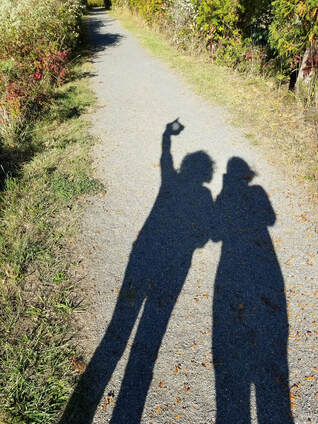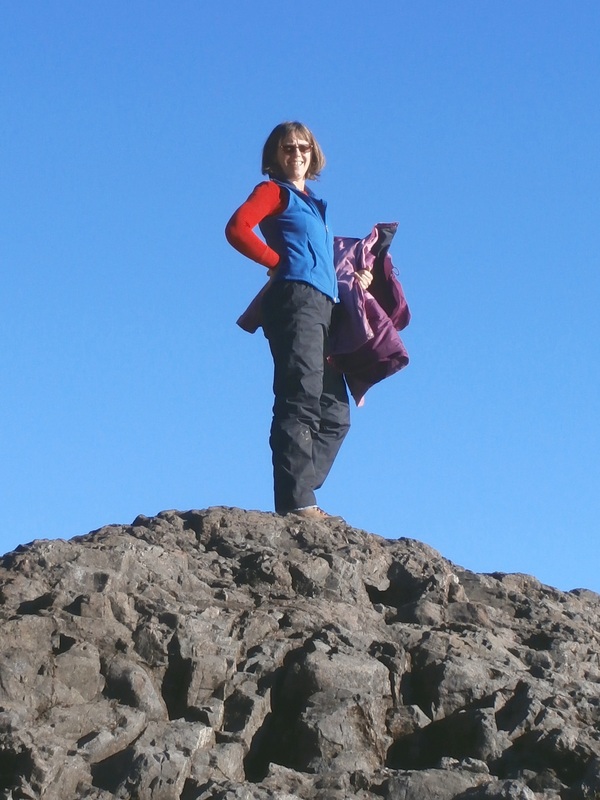|
A Message for the congregation of St. David of Wales, April 23, 2023 What do you think of when you hear the word Emmaus? I have to say that the first I ever heard of it was from a friend of mine went to a weekend long retreat for women called a Walk to an Emmaus. The way she described it was a time away from her work and family where every need of hers was met. In particular, she told me she hadn't brought any ChapStick and the moment she mentioned her need, a new tube of ChapStick awaited her. So, I've associated Emmaus with a magical appearing. And that's partly true. Along the road to Emmaus in Luke's gospel this morning Jesus does magically appear. And I confess, that's all I really knew about this passage before preparing for today's message. I hadn’t remembered any detail except the fact that this is one of the resurrections appearances of Jesus. And I cannot recall a single sermon I've heard about this passage. That doesn't mean I've never heard one, just that I don't remember it. Perhaps it is due to lack of repetition. The four gospels often have similar stories from Jesus’ life, but the resurrection experiences are each unique, so they haven’t become as familiar. It doesn't matter so much why I’m uninformed about this scripture. What matters in my life and in the life of those who follow Jesus, is how encountering the risen Christ in this passage changes those in the scripture and those who read the scripture. Much of what I read about this passage is critical of the two disciples on the road, going so far as to say they are spiritually blind and unable or unwilling to accept God’s miraculous abilities. This declaration and rush to judgment is the sort of thing that always rankles me.
This encounter takes place just hours after Jesus was discovered missing from his tomb. This encounter takes place among people racked with grief, and no doubt wrestling with guilt about their own actions. I'm sure they wondered what they should or could have done differently to prevent Jesus 's death so that he could usher in this new realm of God that he proclaimed. Yes, the two travelers had second-hand news from the women who saw Jesus in the garden— somehow risen from death; somehow able to speak with them. And yes, soon, after more and more resurrection appearances, Jesus followers as a group would begin to understand what had happened. And with that knowledge, they would be inspired by the Holy Spirit and become bold and share that news with thousands of others. But that was still weeks in the future. When Mary is frantically looking for Jesus, he asks her why she is looking for the living among the dead. And my first thought when I read this passage last week, was why would these two men be looking for the dead among the living? How does one embrace an unfathomable possibility within mere hours of hearing such unbelievable news? Of course, these two on the road did not recognize Jesus. Nothing in their lives had every prepared them for such a death defying experience. We don't know exactly who the two travelers are, though some commentators say that Cleopas is also known as Clopas, and is Jesus’s uncle, Joseph’s brother. And it's possible, they say, that the Simon named at the end of this passage as one who has seen Jesus, was the one traveling with Cleopas, and is Cleopas's son otherwise known as Simeon. So, these two are most likely family, which makes sense why they would be walking together, and how they would know this news, and why they would seem to be part of the group and know what the group had heard, but not be part of the inner circle of disciples. What do we do when a loved one dies in a manner that seems so cruel and unfair? We’re broken-hearted, angry, confused, and more. Our certainties and beliefs are tested and battered, familiar constructs and ideas about how “things are” or how “the world works” are shattered and we’re left with pieces. We try and make sense of what has happened, we look for answers which don’t come, in every quiet moment our minds buzz, puzzled, and we retell the story over and over again with those who also grieve, trying to find some comfort in our shared experience. So, when Jesus appears to these two on the road, they are deep into trying to figure out what in the world has just happened, and how in the world they are going to go on living when it seemed as if something was about to change, that life was about to get better, and now those hopes have been dashed. And when Jesus asks what they're talking about, of course their answer is that they're talking about him—though they don't yet know it. I get so annoyed with commentators who shame Jesus’ original followers in these earliest reactions to the resurrection; as if they, or we, would act differently in their place. We were discussing Jesus’ post-resurrection appearance to Mary in the Way of Love Bible study during Holy Week, and how troubling it would still be if someone we’d buried appeared to us alive. We’d think we were crazy. Even today with all the scientific and technological advances that have helped us to verify evidence of an ancient historic flood, and to date relics that show much of biblical history to be grounded in fact, we still do not a satisfactory explanation for bodily resurrection. The Resurrection is something we have to accept on faith. And that faith doesn't always come easily. It often comes with struggle, doubt, and questioning, even for those of us who have 2000 years of writings, and conversion stories, and testimonies of those who have encountered the risen Christ in visions and dreams. Cleopas and Simon had only a few hours to grapple with an utterly changed reality. I believe Cleopas and Simon weren’t spiritually blind at all. I believe they were spiritually sighted. They were open to possibilities beyond the realm of the explanation or any reality they’d known. When they sit down to break bread with Jesus, they do not have centuries of tradition. They do not have the Eucharist and the recitation of Jesus telling them to remember him every time they eat together. Most likely they weren't even in the upper room on that fateful Thursday night. As far as we know it was the small intimate group of 12 gathered for dinner. Cleopas and Simon would have experienced Jesus breaking the bread when he fed the 5000 with a few loaves of bread and a handful of fish. That single meal and the abundance it produced also seems impossible to explain. And it’s in the replication of the words that produced the first impossibility, that allows Cleopas and Simon to realize who is with them. And in that moment of realization he disappears. And what do they do in the wake of this unexpected walk, this eye-opening meal, this disappearance? They turn to each other, and they say, “Oh yes! I get it now! We’ve encountered the risen Jesus! Didn't our hearts burn? Weren't we feeling something deeply deeply powerful and true when he spoke to us about all the ways in which the scriptures needed to be fulfilled?” These two men set aside their intellects to validate their intuition. They listened to the response they felt in their bodies to something that seemed fantastical. How often do we do that? I don't know about you but all too often I find myself second guessing and questioning and doubting and putting aside the signals I feel in my body and in my spirit that don’t seem to align with “the facts.” I tend to discount what comes to me as intuition, or feeling, because I don't want to be judged as silly or emotional, or laughed at or ridiculed for being “woo-woo” and “out there.” I want to be respected, and perceived as thoughtful, rational, and capable. And I don’t think I’m alone in wanting to present a certain kind of persona to the world. When Cleopas and Simon finished dinner, they turned around walked the seven miles back to Jerusalem to tell those who were bereft and perplexed, just as the two of them had been, that they had seen Jesus risen and walking alongside them. The 11 were all still together in a room, hiding and fearful. Even though the women had told them what they had seen, the inner circle wasn’t out spreading the word yet. We are human and it takes time to figure out what we know. And sometimes what we know is impossible to prove. It can only be received and believed by those who understand that there is more to the world than what can be scientifically or rationally explained. When I put myself on that road alongside Cleopas and Simon walking 7 dusty miles from Jerusalem to Emmaus, I want to have the presence of mind to listen to a voice of wisdom that shows up in the midst of very real and raw distress and grief. I want to have the receptivity to believe the eyes of my heart when the logic of my mind tells a different story. I want to have the courage to change my plans and turn around and share with others something that feels deeply true and precious, knowing that some won’t l understand or believe me, but that my words and presence might bring hope and comfort to others. I'm going to remember this passage going forward. I'm going to remember it as a story that exemplifies resiliency and open-hearted faith. I'm going to remember this story as one of celebration not condemnation. And because you are a Christ follower, too, I’m going to walk the road to Emmaus and back to Jerusalem alongside you, speaking the truth that I know, and listening to the wisdom and beauty that the risen Christ has brought into your life. We travel this road together and together we invite others to join us on the journey. Thanks be to God.
0 Comments
Your comment will be posted after it is approved.
Leave a Reply. |
I began blogging about "This or Something Better" in 2011 when my husband and I were discerning what came next in our lives, which turned out to be relocating to Puget Sound from our Native California. My older posts can be found here.
Categories
All
Archives
September 2023
Newsletters |

